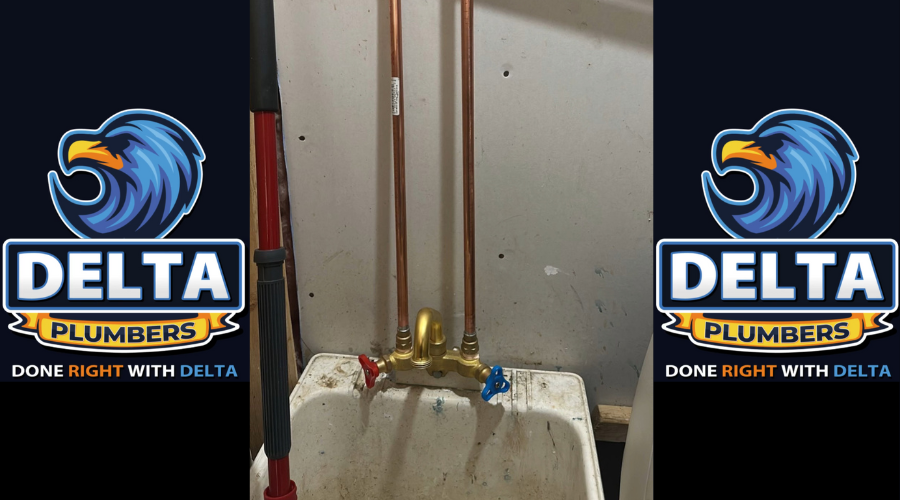As the snow melts and temperatures rise, homeowners often discover a variety of plumbing issues that emerge or worsen during winter. Spring is not only a time for deep cleaning and yard maintenance but also for checking the health of your plumbing system. From leaky pipes and clogged drains to malfunctioning sump pumps, addressing these problems early can save you from expensive repairs and water damage. In this guide, we’ll explore the most common spring plumbing issues and provide actionable tips to prepare your home for the season.

Picture Source – Delta Plumbers
Inspecting and Repairing Leaking Pipes
Winter’s freezing temperatures can cause water inside pipes to freeze and expand, often resulting in small cracks or full pipe bursts. These leaky pipes may go unnoticed until spring when thawing ice allows water to flow freely and leaks become apparent.
Signs of Pipe Leaks:
– Wet spots on walls, ceilings, or floors
– Unexplained rise in water bills
– Musty odours from hidden mould or mildew
– Decreased water pressure
Preparation Tips:
– Visual Inspection: Check all exposed pipes in basements, crawl spaces, garages, and under sinks. Look for corrosion, rust, and visible water droplets.
– Water Meter Test: Turn off all water inside the home and monitor the water meter. If the meter continues running, you likely have a hidden leak.
– Prompt Repairs: Small leaks can be sealed temporarily with pipe tape or epoxy putty, but larger issues require a licensed plumber. Proactively replacing old, worn-out pipes can also prevent future leaks.
Regular plumbing inspections every spring are crucial for preventing costly water damage and mould growth.
Also Read: Water Heater Repair vs. Replacement

Picture Source – Delta Plumbers
Testing and Maintaining Sump Pumps
Spring often brings heavy rain and rising groundwater levels. Without a properly functioning sump pump, you could face unwanted water intrusion or even basement flooding.
Why Sump Pumps Matter:
A sump pump removes excess water from your basement or crawl space, directing it away from your home’s foundation. If it fails, the result can be standing water, mould growth, and damage to your home’s structure.
Preparation Tips:
– Test the Pump: Pour a bucket of water into the sump pit. The pump should activate, drain the water, and shut off automatically.
– Clean the Pit: Remove debris, dirt, or gravel that may clog the intake screen.
– Check the Discharge Line: Ensure it’s not frozen or blocked and directs water away from your home.
– Backup System: Install a battery backup or water-powered backup pump to ensure functionality during power outages.
Regular sump pump maintenance every spring can save you thousands in water damage repairs.
Also Read: Trenchless Sewer Repair: The Future of Sewer Line Replacement Without Digging

Picture Source – Delta Plumbers
Clearing and Preventing Drain Clogs
During winter, debris, grease, and soap scum can accumulate in pipes, causing clogged drains. Spring is the ideal time to clear these blockages before they cause backups.
Common Causes of Drain Clogs:
– Hair and soap in bathroom drains
– Grease and food debris in kitchen sinks
– Outdoor debris like leaves entering storm drains
Preparation Tips:
– Use Natural Cleaners: Pour baking soda followed by vinegar into drains, then flush with hot water to break down buildup.
– Drain Guards: Install mesh strainers to catch hair and debris before they enter pipes.
– Avoid Chemical Cleaners: Over-the-counter drain cleaners can damage pipes over time. Opt for natural or professional solutions.
– Schedule Professional Cleaning: If multiple drains are slow or clogged, a plumber may need to snake or hydro-jet the lines.
Regular drain maintenance helps maintain efficient water flow and prevents unpleasant odours.
Also Read: How to Prevent Basement Flooding in Ontario This Spring

Picture Source – Delta Plumbers
Checking Outdoor Faucets and Sprinkler Systems
Outdoor plumbing fixtures often take the brunt of winter’s freeze. Frozen hose bibs and sprinkler lines can crack, leading to leaks and water waste in spring.
How to Inspect Outdoor Plumbing:
– Turn on Faucets: Once temperatures consistently stay above freezing, turn on exterior faucets and check for leaks or weak water flow.
– Sprinkler System: Activate the system zone by zone. Look for broken sprinkler heads, uneven spray patterns, and soggy areas.
– Frost-Proof Faucets: Upgrade to frost-free spigots to reduce the risk of freeze damage in future winters.
Preparation Tips:
– Repair or replace any damaged fixtures before regular use.
– Insulate outdoor pipes for next winter to prevent freeze damage.
– Drain the sprinkler system properly at the end of each season.
Well-maintained outdoor plumbing conserves water and ensures proper irrigation for your lawn and garden.
Also Read: Spring Plumbing Maintenance Tips for Ontario Homeowners

Picture Source – Delta Plumbers
Evaluating Water Heater Performance
After working overtime in winter, your water heater may accumulate sediment and lose efficiency. Spring is a great time to assess its condition and performance.
Signs Your Water Heater Needs Attention:
– Strange noises (rumbling or popping)
– Inconsistent water temperature
– Rust-colored water
– Reduced hot water supply
Preparation Tips:
– Flush the Tank: Drain a few gallons to remove sediment buildup, which can cause overheating and inefficiency.
– Inspect Components: Check for leaks around the tank, and test the pressure relief valve.
– Temperature Check: Set the thermostat to 120°F to save energy and prevent scalding.
– Consider Upgrades: If your water heater is over 10-12 years old, consider replacing it with an energy-efficient model like a tankless water heater.
Hence, maintaining your water heater ensures a steady hot water supply and lowers energy costs.
Also Read: The Rising Cost of Plumbing Repairs in 2025

Picture Source – Delta Plumbers
Assessing Sewer Line Integrity
Spring’s thawing soil and increased water flow can stress your sewer system, especially if it’s older or compromised by tree roots.
Warning Signs of Sewer Issues:
– Multiple slow-draining fixtures
– Sewage odours inside or outside the home
– Gurgling sounds from drains or toilets
– Water pooling in the yard
Preparation Tips:
– Camera Inspection: A professional sewer camera can detect blockages, cracks, or root intrusions.
– Root Barriers: Install physical or chemical barriers to keep roots away from sewer lines.
– Regular Cleaning: Hydro-jetting removes clogs and debris for smooth flow.
Therefore, Catching sewer line issues early prevents health hazards and expensive emergency repairs.
Also Read: How Technology is Changing Home Water Systems in 2025

Picture Source – Delta Plumbers
Reviewing Gutter and Downspout Functionality
While not technically part of your plumbing, gutters and downspouts play a vital role in managing water around your home. Also, clogged or damaged systems can lead to water pooling near foundations and basement flooding.
Spring Gutter Maintenance:
– Clear Debris: Remove leaves, twigs, and dirt that can clog gutters.
– Check Alignment: Ensure gutters slope correctly toward downspouts.
– Extend Downspouts: Direct water at least 3-4 feet away from your home’s foundation.
– Repair Damage: Fix holes or detached segments to maintain proper water flow.
Hence, proper water diversion protects your foundation and prevents costly water damage during spring rains.
Conclusion
Spring is the perfect season to assess and maintain your home’s plumbing system. By proactively addressing common spring plumbing issues like leaky pipes, clogged drains, and sump pump failures, you can avoid expensive repairs, ensure water efficiency, and keep your home safe and comfortable. Schedule regular inspections, invest in maintenance, and consult professional plumbers for any complex issues. Stay ahead of the season with a plumbing system that’s ready to handle spring’s challenges.









